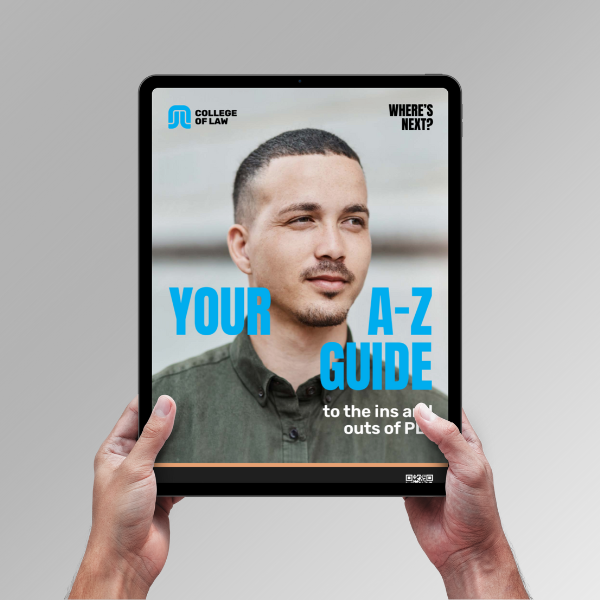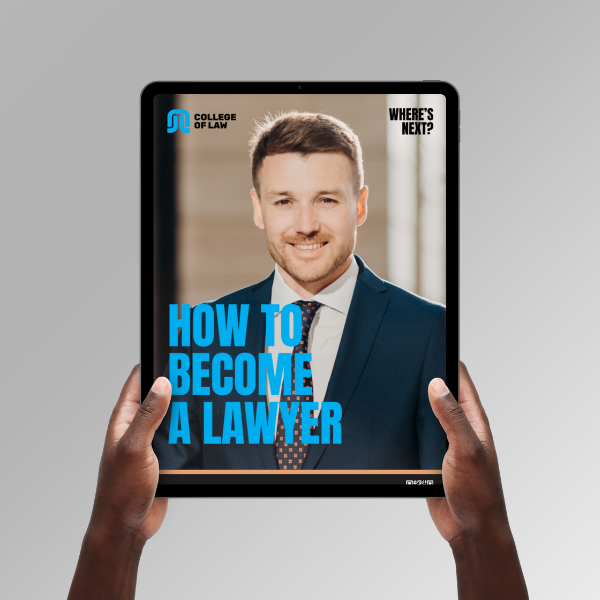THE PATHWAY TO BECOMING A LAWYER
Finishing your law degree is a huge milestone. It marks the end of years of study and the beginning of your professional legal career, but it can also raise important questions about what comes next.
- What happens after your final exam?
- When should you start Practical Legal Training (PLT)?
- How does admission work?
- What if you don’t have a grad job or clerkship yet?
If you’re feeling unsure about what comes next, you’re not alone. Every year, thousands of law students ask the same questions as they plan their path to admission.
This page provides a clear, practical guide to what happens after law school and how to move confidently from law student to admitted lawyer.
THE PATHWAY
- Finish your law degree
Complete a Bachelor of Laws (LLB) or Juris Doctor (JD), which provides the foundational legal knowledge - Complete a Practical Legal Training course (PLT)
A short, skills-based program that prepares you for real legal work. - Apply for admission as a lawyer
After completing your law degree and PLT, you can apply for admission through your state's Admissions Authority. - Start practising law
Once admitted, you can begin practising as a solicitor in your first legal role.
If you’ve searched “How to become a lawyer in Australia” or “What happens after a law degree?” this is the roadmap you're looking for.
WHAT IS PRACTICAL LEGAL TRAINING (PLT)?
Location
Available in 7 states, with local content.
Start Dates
200+ start dates across the year.
Program Length
15, 18, or 30 weeks.
Cost
Domestic $9,200 / International $13,270.
A practical legal training course that teaches you how to work as a lawyer.
PLT is the final step between your law degree and admission. In simple terms:
- Law school teaches you legal theory
- PLT teaches you legal practice
During PLT you’ll learn how to:
- Run a client file
- Draft legal documents
- Interview clients
- Negotiate and advocate
- Manage deadlines and professional obligations
Most students complete PLT after finishing their law degree. Some start a little earlier, depending on their academic progress.

DO I NEED TO DO PLT TO BECOME A LAWYER?
For the vast majority of graduates, PLT is the pathway they choose.
If you're searching "Do I need PLT?" or "Is PLT required?", here's what you need to know.
A practical legal training course (PLT) is the standard pathway to becoming a lawyer in Australia, and it's the route most graduates take because it's:
- A widely recognised pathway
- A structured course with built-in guidance and support
- Designed to prepare you for real legal practice
A few jurisdictions offer supervised practice alternatives, but these are far less common.
WHEN SHOULD YOU START PLT?
This is one of the most Googled questions: “When do I start PLT?”
Most graduates begin PLT:
- Right after finishing their law degree, or
- Within 6–12 months of graduating
You do not need to wait until:
- Your final transcript is issued
- You have a graduate job
- You’ve done a clerkship
You can start PLT when you’ve either:
- graduated from your law degree, or
- completed all Priestley 11 core subjects (with some electives left)*
If you’re not sure where you fit, that’s totally normal — it depends on your university, your subjects, and your goals.

How long does everything take?
From finishing uni to admission: usually 6–12 months
Here’s the quick version:
- PLT takes several months, depending on whether you study full-time or part-time
- Work experience requirements vary, but often take place alongside your coursework
- Admission ceremonies run on set dates each year, so timing depends on your state or territory
Most students are admitted within a year of finishing their law degree.
DO I NEED A CLERKSHIP OR GRAD ROLE BEFORE PLT?
Start a new law career virtual internship
Want to try before you apply – and sharpen your legal skills while you’re at it?
Complete a (free) virtual internship in five in-demand NewLaw careers:
Legal data analyst
Legal operations
Legal technologist
Legal knowledge manager
Family law mediator.
No. They’re helpful but not required.
Clerkships and graduate roles can help you gain experience, especially with commercial firms, but they are not required for:
- PLT
- Work experience
- Admission
- Starting your legal career

HOW PLT FITS INTO ADMISSION
To be admitted as a lawyer in Australia, you’ll need:
- your completed law degree
- your PLT certificate
- fit and proper person checks
- an admission application through your state’s Admissions Authority
Once you complete PLT, you’re eligible to apply for admission and attend your admission ceremony.
WHAT DO I DO NOW?
Plan your PLT and admission timing
If you’re wondering what to do after law school, when you should start PLT, or how to become a lawyer in Australia, this section outlines the next steps to take.
1. Decide when you’d like to be admitted
Think about your preferred admission date and work backwards. This helps you plan your study, work experience and application timeline with confidence.
2. Choose a PLT start date that fits your timing
PLT intakes run throughout the year, so you can select a start date that aligns with your personal commitments, job plans and admission goals.
Once you know the order of steps — law degree → PLT → work experience → admission — the whole process becomes much clearer.
NOT READY TO ENROL? START WITH THIS.
JOIN OUR NEWSLETTER
Sign up to keep up to date with latest news, programs, events and career tips.




